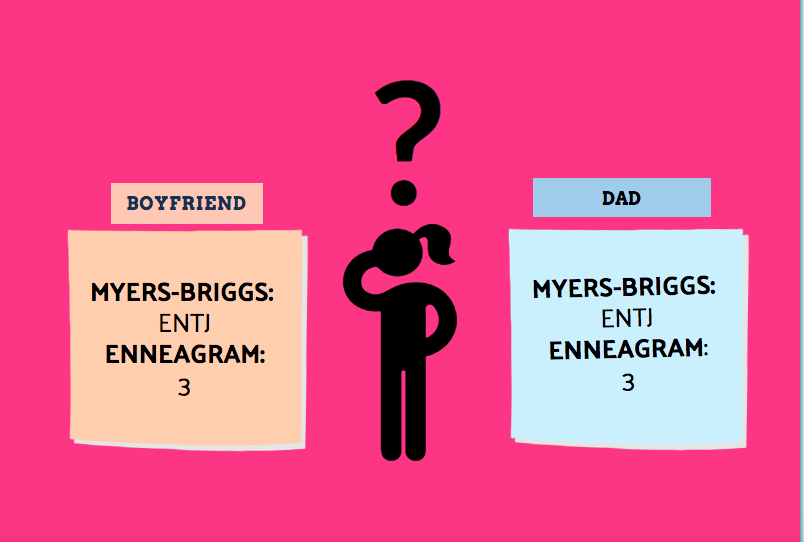Why is Your Boyfriend So Much Like Your Dad?
Your opposite sex parent has a lot more influence in your romantic relationships than you may have realized.
The person you date often shares characteristics with your opposite sex parent.
My sister has been dating her boyfriend for over a year and a half. Even though she went to college twelve hours away from home, she found someone who is surprisingly similar to my dad. Both are accounting majors, who are silly, good story tellers, great with kids, athletic, and driven. In fact, after I forced both my dad and her boyfriend to take the Myers-Briggs test, I found that they are both ENTJs, and threes on the Enneagram.
I was shocked but decided it was most likely a unique coincidence. However, after spending a weekend with my brother and his girlfriend, I was even more amazed. My brother’s girlfriend at first doesn’t seem at all like my mom, but the more I spent time with her and heard my brother talk about her, I realized there were some amazing similarities. For example, both are people pleasers, diligent workers, perfectionists, easy to talk to, sensitive, deeply aware, and caring people. The only difference in their Myers-Briggs is that my mom is an introvert and his girlfriend is an extrovert. However, my brother has always said that his girlfriend reminds him of my mom.
This led me to wonder and question how much, if at all, parents influence the people we are in relationships with and date. After researching, I found that this is a real psychological phenomenon that can be presented in two forms: you either have a secure relationship with your opposite sex parent and look for someone who will provide that same type of security, or, as a result of an insecure relationship with your opposite sex parent, you will subconsciously look for someone who also treats you this way. This is a result of the “attachment theory.”
For example, an article in May of 2014 written on Psychology Today by Peg Streep says, “As human beings, we are drawn, on an unconscious level, toward the familiar. For a securely attached individual whose primary connections have taught her that people are loving, dependable, and trustworthy, this is just dandy. But for those of us who are insecurely attached, the familiar can be dangerous territory.”
The attachment theory basically says we will internalize how our parents treat us and each other as our sense of self. This impacts how we see ourselves and what we seek out in partners.
In an interview with Dr. Rebecca Bergen, a licensed clinical psychologist, posted in August of 2019 on MyDomaine, Bergen explains how the attachment theory influences who we form relationships with: “If parents showed love, responded to our needs, and validated our feelings, then we were more likely to develop a secure attachment style. We then seek out and desire that same attachment style as an adult.”
A secure attachment style is the first form of how parents impact our dating life. When kids feel secure in their home and loved by their opposite sex parent, then they search for someone like that parent which is a positive form of the attachment style.
Streep makes this clear by saying, “Needless to say, when romantic partners [are] like parents in good ways, relationship satisfaction [is] relatively high.”
However, when children grow up in an insecure relationship with their opposite sex parent, then when they look for a partner, they will most likely find someone who will resemble what they’ve grown up with, which “when the similarities [are] related to negative characteristics, relationship satisfaction [is] relatively low,” says Streep.
Your parents also influence how you act in a relationship based on how they treat each other. Children who have grown up in a secure home and who have watched their parents be kind to one another and handle conflict well will likely become adults who are more confident in themselves and will expect to be treated well in return.
Therefore, it makes sense that the opposite is true for kids growing up in an insecure home where they “have a fragmented sense of self, which may lead to low self-esteem, anxiety in relationships, doubt that we can trust others, and sometimes being more apt to seek out relationships that mimic this same attachment—not because it feels good but because it is familiar to us,” says Bergen.
As kids, we see and internalize our parents’ relationship, which influences how we view ourselves and act in a relationship, while our attachment to our opposite sex parent also impacts us so that we will most likely find someone with similar characteristics.
Humans seek out the familiar because it is known and what we are used to, and romantic relationships are not any different.




